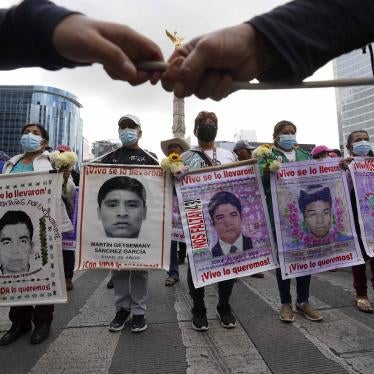Washington, DC, January 18, 2024
Andrés Manuel López Obrador
President of Mexico
Alicia Bárcena Ibarra
Secretary of Foreign Relations of Mexico
Dear President López Obrador and Secretary Bárcena,
I write to you, on behalf of Human Rights Watch, to share our profound concerns regarding the immigration policy proposals currently being discussed in the United States Congress. I would like to urge the Mexican government to make a clear and public declaration that it will not agree to participate in any new migration management arrangement with the United States, whether formal or informal, that would lead to an increase in the expulsions of non-Mexican migrants and asylum seekers to Mexico, close existing legal pathways for migration, limit access to international protection, or establish a de facto “safe third country” agreement with the United States.
As part of the negotiations of the 2024 United States federal budget, President Joseph R. Biden and members of the US Congress are considering changes to US immigration policy that could effectively end the right to seek asylum on US territory, expose thousands of mostly Latin American asylum seekers to abuses, and contravene international human rights standards.[1] Lawmakers have proposed these harsh new restrictions in exchange for their support to authorize over US$100 billion in aid funding for Ukraine and Israel.[2]
Many of these proposed changes would require the active participation of Mexico or would affect existing agreements between the United States and Mexico, meaning they would require the consent of the Mexican government in order to be implemented.
The Biden administration has reportedly agreed to support the creation of a new rule that would allow the US government to temporarily close the US-Mexico border and expel all asylum seekers without hearing their claims, similar to the Title 42 expulsion policy, under which hundreds of thousands of people were expelled to Mexico.[3] A new policy of expelling migrants to Mexico could only be implemented if the Mexican government were to agree to receive the expelled people.
US legislators have also proposed restrictions that would effectively put an end to the US humanitarian parole program for Cubans, Haitians, Nicaraguans, and Venezuelans, which was created after negotiations between the US and Mexico, in response to “Mexico’s requests to expand labor and humanitarian mobility mechanisms in the region.”[4] When the two governments announced the creation of the parole program, Mexico agreed to receive up to 30,000 Cuban, Haitian, Nicaraguan, and Venezuelan migrants and asylum seekers expelled from the United States per month while the Biden administration agreed to allow the same number of migrants of those nationalities to apply for permission to travel to the United States under the program. [5] Ending the humanitarian parole program would require a re-negotiation of this agreement.
Finally, US legislators have proposed to make permanent the requirement that asylum seekers in the United States must show proof of having first applied and been rejected for asylum by Mexico or another country they travelled through on the way to the United States.[6] This rule, often referred to as the “transit ban” or “third-country transit rule,” combined with the abovementioned expulsion policy, would create a de facto safe third country arrangement between Mexico and the United States—something President López Obrador, Secretary Bárcena, and other members of your administration have repeatedly stated Mexico would never accept.[7]
The proposals being considered in the United States could have devastating consequences for the rights of migrants and asylum seekers if implemented, undermining the right to seek asylum and exposing thousands of people to serious danger. Migrants who are expelled from the US to Mexico often suffer kidnapping, extortion, assault, and other serious abuses at the hands of criminal groups and corrupt officials. As President López Obrador has recognized, migrants are often exposed to increased danger when they are forced to wait near the US-Mexico border.[8] And as the Mexican government said in a statement in May 2023, the Title 42 border expulsion policy “made it impossible to seek asylum and exposed thousands of migrants to increased risk.”[9]
Given that many of the proposals now under consideration would require the consent of the Mexican government to be implemented, you currently have the opportunity to help protect the rights of the mostly Latin American migrants and asylum seekers who would be harmed if this legislation moves forward in the US Congress and these proposals are implemented.
I urge you to make a clear, public declaration that Mexico will not agree to participate in any new migration management agreement that would lead to a further increase in the expulsion of asylum seekers to Mexico.
I remain at your disposal to discuss this matter further or share additional information regarding the situation at the US-Mexico border.
Juanita Goebertus Estrada
Director
Americas Division
Human Rights Watch
[1] Secure the Border Act, H.R. 2, 118th US Congress (2023), https://www.congress.gov/bill/118th-congress/house-bill/2/summary/00 (consulted on January 18, 2024).
[2] “Speaker Johnson and House Republicans Visit Southern Border to Highlight Biden Administration and Senate Democrat Refusal to Address Crisis,” news release by U.S. Congressman Mike Johnson, January 3, 2024, https://mikejohnson.house.gov/news/documentsingle.aspx?DocumentID=1353 (consulted on January 18, 2024).
[3] Camilo Montoya-Galvez, “White House open to new border expulsion law, mandatory detention and increased deportations in talks with Congress,” CBS News, December 12, 2023, https://www.cbsnews.com/news/immigration-white-house-congress-border-security-detention-deportation/ (consulted on January 18, 2024).
[4] Secure the Border Act, H.R. 2, 118th US Congress (2023); “México recibe con agrado el anuncio de nuevas acciones por parte de EE.UU. para lograr una migración ordenada, segura, regular y humana,” Mexican government news reléase, January 5, 2023, https://www.gob.mx/sre/prensa/mexico-recibe-con-agrado-el-anuncio-de-nuevas-acciones-por-parte-de-ee-uu-para-lograr-una-migracion-ordenada-segura-regular-y-humana (consulted on January 18, 2024).
[5] Remarks on Border Security and Enforcement, President Joe Biden, Washington, DC, January 5, 2023, https://www.whitehouse.gov/briefing-room/speeches-remarks/2023/01/05/remarks-by-president-biden-on-border-security-and-enforcement (consulted on January 18, 2024).
[6] Secure the Border Act, H.R. 2, 118th US Congress (2023).
[7] President Andrés Manuel López Obrador, press conference in Mexico City, August 24, 2022, https://www.gob.mx/presidencia/articulos/version-estenografica-conferencia-de-prensa-del-presidente-andres-manuel-lopez-obrador-del-24-de-agosto-de-2022 (consulted on January 18, 2024); Post on X by @m_ebrard, September 9, 2019, https://twitter.com/m_ebrard/status/1171142741906153473 (consulted on January 18, 2024); “México no aceptará ser ‘tercer país seguro’ para migrantes, señala Ebrard,” La Jornada, June 4, 2019, https://www.jornada.com.mx/2019/06/04/politica/004n1pol (consulted on January 18, 2024); Comparecencia de la Mtra. Alicia Bárcena Ibarra, Secretaria de Relaciones Exteriores ante el Senado de la República, October 17, 2023, https://www.senado.gob.mx/65/intervenciones/1293/34255 (consulted on January 18, 2024).
[8] President Andrés Manuel López Obrador, press conference in Mexico City, February 11, 2021, https://www.gob.mx/presidencia/articulos/version-estenografica-conferencia-de-prensa-del-presidente-andres-manuel-lopez-obrador-del-11-de-febrero-de-2021 (consulted on January 18, 2024).
[9] “Se registran bajo Título 42 más de 2.8 millones de eventos de expulsión,” Mexican government news release, May 10, 2023, https://www.gob.mx/segob/prensa/se-registran-bajo-titulo-42-mas-de-2-8-millones-de-eventos-de-expulsion (consulted on January 18, 2024).








